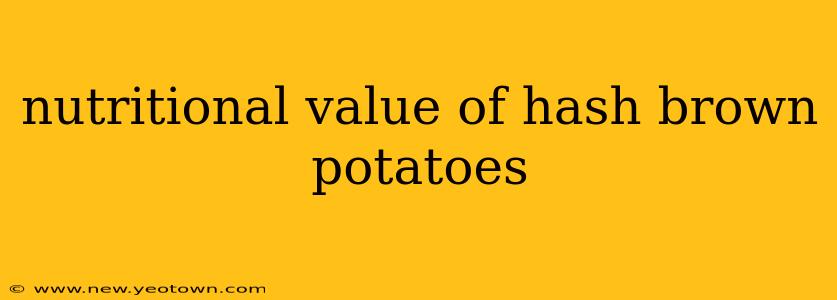Let's be honest, hash browns are comfort food personified. That crispy, golden exterior and fluffy interior are undeniably delicious. But beyond the delightful taste, what's the nutritional story behind this breakfast (or any-time-of-day) staple? Many people overlook the actual nutritional value of hash brown potatoes, often associating them solely with carbs and grease. However, the nutritional content can vary significantly depending on how they're prepared. Let's peel back the layers (pun intended) and explore the nutritional truth behind these beloved potatoes.
What are the main nutritional components of hash browns?
Hash browns, at their core, are made from potatoes. Therefore, the nutritional profile largely depends on the potato type and cooking method. Generally, a serving of hash browns provides carbohydrates, some protein, and a modest amount of essential nutrients. However, the fat and calorie content can dramatically increase depending on the amount of oil used during cooking. We'll explore the specifics in more detail below.
Are hash browns a healthy breakfast option?
This is a question with a nuanced answer. Hash browns themselves aren't inherently unhealthy, but the way they're prepared significantly impacts their nutritional value. A small serving of hash browns made with minimal oil and possibly incorporating some added vegetables can be a part of a balanced breakfast. However, loading them up with butter, oil, and cheese quickly transforms them into a calorie and fat-heavy meal. Moderation and mindful preparation are key.
How many calories are in a serving of hash browns?
The calorie count of hash browns is highly variable. A small serving of home-made hash browns, cooked with a minimal amount of oil, might contain around 150-200 calories. However, restaurant versions or those made with extra oil, butter, or cheese can easily exceed 300-400 calories per serving. Always check the nutritional information if you're eating them from a restaurant.
What are the benefits of eating hash browns?
While not a nutritional powerhouse, hash browns can contribute to your daily intake of certain nutrients. Potatoes are a source of potassium, a vital mineral for maintaining healthy blood pressure. They also offer some vitamin C and dietary fiber, although deep-frying can significantly reduce these nutrients.
Are there healthier ways to make hash browns?
Absolutely! Here are some tips for creating healthier hash browns:
- Choose the right potato: Russet potatoes are a common choice, but Yukon Golds offer a slightly sweeter flavor and creamier texture.
- Minimize oil: Use a non-stick pan and a minimal amount of oil, or even try air-frying for a crispier result with less oil.
- Add vegetables: Incorporate other vegetables like onions, peppers, or zucchini for added nutrients and flavor.
- Control portion sizes: Stick to a smaller serving to manage calorie and fat intake.
What are the potential drawbacks of eating hash browns?
The main drawbacks are associated with the cooking methods. Deep-frying or using excessive amounts of oil significantly increases the calorie, fat, and saturated fat content. This can contribute to weight gain and increase the risk of heart disease. Additionally, over-consumption of potatoes can lead to a high carbohydrate intake, which might not be suitable for individuals managing blood sugar levels.
The nutritional value of hash browns is a complex picture, heavily influenced by the preparation method. By making conscious choices about ingredients and cooking techniques, you can enjoy this beloved dish while minimizing potential health drawbacks and reaping the benefits of the potato’s nutritional offerings. Remember, balance and moderation are key to a healthy diet.

